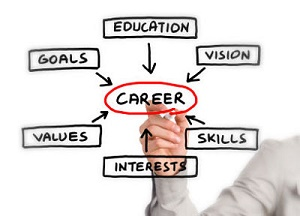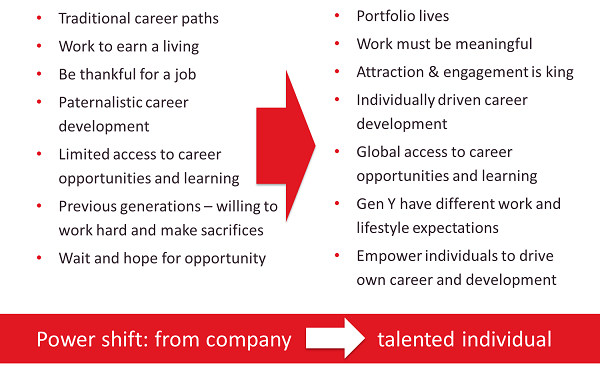ATD Blog
Career Development: From Passive Entitlement to Active Accountability
Mon Apr 13 2015

“First think, second believe, third dream, and finally dare.”—Walt Disney
The world of work is shifting from traditional and predictable career paths, to relentless change, leaner structures, evolving roles, global opportunities, portfolio lives, and a need to find meaning and purpose from work. This shift leaves a lot of employees uncertain, confused, and anxious about how to secure a sustainable income—and ensure that they are rewarded for adding value to a business or industry.
New Landscape
Many young people (Millennials) are entering the workplace with outdated or unrealistic ideas about what constitutes value or how to carve out a niche for their unique skills and talent. Many have learned from their parents how to be the type of an employee with a predictable career at a company that made many of their developmental decisions for them. These expectations can bring about a sense of entitlement, as well as intolerance for not being looked after and treated well.
Meanwhile, an increasing number of those already in the workplace (Gen Xers and Baby Boomers) are shell-shocked by restructuring, downsizing, mergers/acquisitions, financial crises—not to mention being passed over for younger, more global, tech savvy individuals. This situation can bring about a sense of resentment and disengagement among this cohort.
The talent landscape also is shifting. In the past, organizations had most of the power, resources, and decision rights. In today’s world, though, talented individuals have more choice and different lifestyle expectations, and they demand to be treated as unique individuals.

New Skill Set
A new skill set and mindset is required to drive a successful path through the various career options, as well as to cope with volatility, complexity, and uncertainty. Employees need to learn how to be more adaptable, courageous, and resilient, as well as how to connect, collaborate, influence and inspire others. In addition, they require an understanding of how to investigate career choices—matching them to existing skills, talents, and strengths (while managing any possible derailers).
More importantly, a sense of curiosity and thirst for fast learning, continuous improvement, and innovation is essential for anyone who wants to stand out from the crowd and navigate transitions gracefully. Finally, the ability to cultivate a unique personal brand through a digital and face-to-face image, relationships, and behaviors can prepare employees for new opportunities.
The sad fact is that many of our educational institutions are not sufficiently preparing learners for this new world of work. Not only is there a high drop-out rate from colleges (25 percent in the United States, for students attending full-time) but those that do enter the workforce often require a significant amount of upskilling, re-skilling, and development around personal and career empowerment.
Next Steps
Some critical questions to explore to build personal and career empowerment include:
What are the drivers in the world of work and how do you create value?
What makes you unique, what drives you, and how can you make the most of what you have?
What are organizations looking for when they search for talent?
How can you build your distinctive value and personal brand?
How can you maximize your performance and fast-track your development?
What qualities and competencies are core to becoming the best you can be?
How can you make the best career choices and make the most of transitions?
Organizations that invest in learning initiatives and find answers to these questions are far more likely to shift employee attitudes and career mindsets from passive entitlement to active accountability. The added benefits of this investment are clear: greater employee engagement, a shift in culture, and a growing pool of talent that is ready to tackle future challenges and opportunities.
Debbie Craig is a featured speaker at the ATD 2015 Conference and Exposition. Join her for the session, M100 - Transforming Culture Through Career and Personal Empowerment, May 18, 2015.
